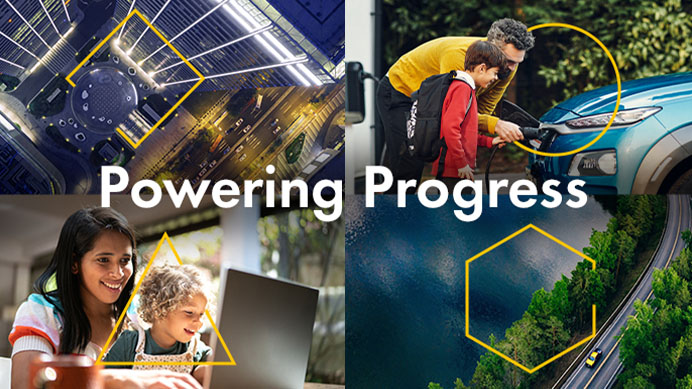In an era where energy companies face mounting pressure to address climate change, Shell made waves with its bold “Powering Progess” campaign. Launched in 2024, this initiative wasn’t just another corporate PR stunt – it was a seismic shift in how one of the world’s largest oil and gas companies positioned itself in a rapidly evolving energy landscape. But what made this campaign tick? How did Shell manage to rebrand itself as a progressive force in the energy transition? Buckle up, because we’re about to take a deep dive into one of the most fascinating marketing case studies of the decade!
Did you know? Shell invested a staggering $500 million in this campaign, making it the company’s largest marketing expenditure in its 117-year history!
The Genesis of “Powering Progress”
The need for Shell’s rebranding didn’t emerge overnight. For years, the company had been grappling with image challenges in a changing energy landscape. As public awareness of climate change grew and governments worldwide started pushing for cleaner energy solutions, Shell found itself at a crossroads. The company’s traditional image as an oil and gas giant was increasingly at odds with the global shift towards sustainability.
To address this challenge, Shell embarked on an extensive market research initiative. They conducted consumer sentiment analysis across multiple countries, focusing on perceptions of energy companies, sustainability concerns, and expectations for the future of energy. The results were eye-opening: while Shell was respected for its technical expertise and global reach, it was also seen as part of the problem rather than the solution when it came to climate change.
Armed with these insights, Shell’s leadership set ambitious objectives for the campaign. They aimed to reposition the company as a leader in the energy transition, appeal to environmentally conscious consumers and investors, and inspire their workforce to embrace a new corporate vision. The target audience was broad, encompassing consumers, business partners, policymakers, and potential employees, with a particular focus on millennials and Gen Z who would shape the future of energy consumption.
The creative brief handed to Shell’s marketing team and partner agencies was nothing short of revolutionary. It called for a complete overhaul of the company’s brand identity, messaging, and marketing approach. The brief emphasized the need to showcase Shell’s investments in renewable energy and innovative technologies while acknowledging its legacy in traditional energy sources. The challenge was clear: create a campaign that would position Shell not just as an energy company, but as a catalyst for progress in a rapidly changing world.
Campaign Strategy and Execution
At the heart of the “We Power Progress” campaign was a fundamental shift in Shell’s core message. The company moved away from positioning itself simply as an “energy company” and instead embraced the role of a “progress enabler.” This new narrative focused on how Shell’s diverse energy solutions and technologies were driving advancements in various sectors, from transportation and manufacturing to agriculture and urban development.
The visual identity of the brand underwent a significant transformation to reflect this new positioning. While retaining its iconic shell logo, the company introduced a more dynamic and vibrant color palette. The traditional red and yellow were complemented by shades of green, blue, and purple, symbolizing the diverse energy sources in Shell’s portfolio. The design philosophy emphasized motion and transformation, with flowing lines and gradients representing the continuous nature of progress.
Shell adopted a multi-channel approach to ensure maximum reach and impact. The campaign launched with a series of high-profile television commercials that told emotional stories of how energy enables human progress. These were complemented by an extensive digital marketing push, including a redesigned website, interactive social media content, and targeted online advertising. Print advertisements in major publications featured thought-provoking visuals and headlines, while experiential marketing elements, such as interactive exhibits in major cities, allowed the public to engage directly with Shell’s vision for the future.
To amplify its message, Shell formed strategic partnerships with environmental organizations, tech companies, and influential thought leaders in the sustainability space. These collaborations lent credibility to Shell’s claims and helped to reach audiences that might have been skeptical of a traditional energy company’s messaging.
Recognizing that true transformation starts from within, Shell also implemented a comprehensive internal communication strategy. Employees were engaged through town hall meetings, workshops, and a dedicated intranet portal that kept them informed and involved in the campaign’s progress. This internal focus ensured that Shell’s workforce became authentic brand ambassadors, embodying the “We Power Progress” ethos in their daily work and interactions.
Digital Marketing Tactics
The digital component of the “Powering Progress” campaign was crucial in reaching and engaging younger, tech-savvy audiences. Shell’s website underwent a complete redesign, featuring an intuitive user interface and a content strategy focused on storytelling. Interactive infographics, video testimonials, and virtual tours of Shell’s innovative projects brought the company’s progress narrative to life.
Social media played a pivotal role in the campaign. Shell created the hashtag #PoweringProgress, encouraging users to share their own stories of progress enabled by energy. Influencer partnerships were carefully curated, with Shell collaborating with environmentalists, tech innovators, and social entrepreneurs to create authentic content that resonated with different audience segments. User-generated content was prominently featured, giving a voice to consumers and communities impacted by Shell’s initiatives.
Search engine optimization (SEO) and pay-per-click (PPC) advertising were meticulously planned to ensure that Shell dominated the digital conversation around energy transition and innovation. The company invested in long-tail keywords related to renewable energy, sustainable technologies, and corporate responsibility, aiming to shift its association in search results from traditional oil and gas to progressive energy solutions.
Email marketing and customer relationship management (CRM) initiatives were revamped to align with the new brand message. Personalized content journeys were created for different stakeholder groups, providing tailored information on Shell’s progress in areas most relevant to each recipient. This approach helped to nurture leads and build long-term relationships with customers, partners, and investors.
One of the most innovative aspects of the digital campaign was the use of virtual and augmented reality experiences. Shell developed a VR app that allowed users to explore future energy scenarios, showcasing how the company’s technologies could shape sustainable cities, transportation systems, and industrial processes. These immersive experiences were available both online and at physical events, creating a memorable and shareable brand interaction.
Traditional Media and PR Efforts
While digital channels were crucial, Shell recognized the enduring power of traditional media in shaping public opinion. The company launched a series of television commercials that were more like short films, each telling a compelling story of progress enabled by energy. One particularly memorable ad featured a young engineer in a developing country using Shell’s solar technology to bring electricity to her village for the first time, highlighting the transformative power of accessible energy.
Print advertisements in major publications took a bold, minimalist approach. Full-page spreads featured striking imagery of renewable energy projects juxtaposed with thought-provoking headlines that challenged readers to rethink their perceptions of Shell and the energy industry as a whole.
Outdoor advertising played a significant role in bringing the campaign to urban populations. In key markets, Shell executed city takeovers, transforming bus stops, billboards, and even entire buildings into interactive displays showcasing the company’s vision for a sustainable energy future. These installations often incorporated renewable energy elements, such as solar-powered lighting or kinetic energy harvesters, turning the ads themselves into demonstrations of progress.
The PR team worked tirelessly to secure positive media coverage and manage potential crises. They developed comprehensive press kits and organized exclusive behind-the-scenes tours of Shell’s most innovative facilities for journalists. The company’s executives were coached to become authentic spokespeople for the new brand vision, participating in high-profile interviews and speaking engagements at industry conferences and climate action events.
Anticipating potential backlash, Shell’s PR team developed a proactive crisis management strategy. They prepared transparent responses to common criticisms, acknowledging the company’s historical role in the fossil fuel industry while emphasizing its current investments and future commitments to sustainable energy. This approach aimed to address skepticism head-on and demonstrate Shell’s genuine commitment to change.
Sustainability and Corporate Social Responsibility (CSR) Tie-ins
The “Powering Progress” campaign was intrinsically linked to Shell’s sustainability initiatives and corporate social responsibility efforts. The company used the campaign as a platform to highlight its substantial investments in renewable energy, including offshore wind farms, solar projects, and advanced biofuels research. Shell set ambitious targets for reducing its carbon footprint and communicated these goals transparently through the campaign.
To showcase its commitment to environmental stewardship, Shell launched a series of high-profile partnerships with conservation organizations and climate research institutions. These collaborations went beyond mere sponsorship, involving Shell’s technical expertise and resources in meaningful projects that demonstrated tangible environmental benefits.
Community engagement became a cornerstone of the campaign. Shell initiated a global grant program called “Progress Makers,” which funded local initiatives aimed at addressing energy poverty and promoting sustainable development. The stories from these community projects were woven into the campaign narrative, providing powerful examples of Shell’s positive impact on the ground.
Recognizing the importance of transparency in building trust, Shell overhauled its sustainability reporting practices. The company committed to regular, detailed disclosures of its progress towards environmental goals, including third-party audits and real-time data dashboards accessible to the public. This level of openness was unprecedented in the industry and helped to address concerns about greenwashing.
To tackle skepticism head-on, Shell created a series of frank, documentary-style videos featuring conversations with environmental critics. These pieces didn’t shy away from difficult questions but showcased Shell’s willingness to engage in dialogue and its commitment to continuous improvement in its sustainability practices.
Measuring Campaign Success
The success of the “Powering Progress” campaign was measured against a comprehensive set of key performance indicators (KPIs) and metrics. These included traditional marketing metrics such as brand awareness, recall, and sentiment, as well as more specific indicators related to Shell’s strategic objectives.
One of the most significant outcomes was the shift in brand perception. Independent surveys conducted before and after the campaign showed a marked improvement in Shell’s image, particularly among younger demographics. The company saw a 40% increase in respondents who viewed Shell as a leader in clean energy solutions, and a 35% rise in those who believed the company was genuinely committed to addressing climate change.
Social media engagement provided real-time insights into the campaign’s impact. The #PoweringProgress hashtag generated over 2 million mentions across platforms, with sentiment analysis showing a 60% positive or neutral tone – a significant improvement from pre-campaign levels. User-generated content related to the campaign reached over 100 million impressions, indicating strong audience engagement and message amplification.
While the primary goal of the campaign was brand repositioning rather than immediate sales impact, Shell did observe positive trends in its renewable energy and clean tech divisions. The company reported a 25% increase in inquiries about its clean energy solutions from both individual consumers and business clients. Market share in the electric vehicle charging sector saw a particular boost, with Shell’s charging network expanding by 50% during the campaign period.
The campaign’s success was also recognized within the industry. “We Power Progress” won several prestigious marketing and sustainability awards, including a Cannes Lion for the integrated campaign and an Effie for brand transformation. These accolades not only validated the campaign’s creative approach but also its effectiveness in achieving business objectives.
Challenges and Criticisms
Despite its overall success, the “Powering Progress” campaign faced significant challenges and criticisms. Environmental groups were quick to question the authenticity of Shell’s message, pointing to the company’s continued investments in fossil fuel extraction. Greenpeace launched a counter-campaign titled “Progress or Pretense?” which gained traction on social media and sparked debates about corporate responsibility in the energy sector.
Media scrutiny was intense, with journalists and fact-checkers meticulously examining every claim made in the campaign. While Shell had anticipated this and ensured that all statements were verifiable, the level of skepticism they encountered required constant vigilance and responsive communication from the PR team.
Internally, the campaign faced some resistance from employees in traditional oil and gas divisions who feared that the new direction might threaten their jobs. Shell addressed these concerns through extensive internal communications and by highlighting how skills from traditional energy sectors were being applied to new, sustainable technologies.
Balancing the message between Shell’s traditional energy business and its growing focus on new energy solutions proved to be an ongoing challenge. The company had to carefully navigate this dual identity, acknowledging its current reality while emphasizing its vision for the future.
Regulatory and legal considerations varied across different markets, requiring the campaign to be flexible and adaptable. In some regions, strict advertising standards for energy companies meant that certain claims had to be modified or substantiated with additional documentation.
Lessons for Other Brands
Shell’s “We Power Progress” campaign offers valuable lessons for other brands facing similar challenges:
- Authentic storytelling is crucial in rebranding efforts, especially when addressing sensitive issues like environmental impact. Shell’s success came from acknowledging its past while clearly articulating its vision for the future.
- Actions must align with marketing messages. Shell backed up its campaign with substantial investments in renewable energy and transparent reporting of its progress, lending credibility to its claims.
- Engaging employees as brand ambassadors is essential for transformation. Shell’s internal communication efforts ensured that the new brand vision was embraced throughout the organization.
- Partnerships and collaborations can provide credibility and extend reach. Shell’s alliances with environmental organizations and tech companies helped to validate its message and reach new audiences.
- Anticipating and addressing criticism proactively is key when rebranding in a controversial industry. Shell’s transparent approach to addressing concerns helped to mitigate potential backlash.
- Integrated, multi-channel campaigns are necessary to reach diverse stakeholders. Shell’s combination of traditional and digital media ensured comprehensive coverage and engagement.
- Long-term commitment is essential for true brand transformation. Shell recognized that “We Power Progress” was not just a campaign but the beginning of a new corporate identity that would evolve over time.
Future Outlook and Campaign Evolution
As Shell looks to the future, the “Powering Progress” campaign is set to evolve alongside the company’s business strategy. The long-term brand strategy extends beyond the initial campaign, with plans to continually refresh the message to reflect Shell’s latest innovations and achievements in sustainable energy.
The company has announced that future updates to the campaign will be closely tied to product and service launches in the clean energy sector. As Shell expands its offerings in areas such as hydrogen fuel cells, advanced biofuels, and smart grid technologies, the campaign will shift to highlight these specific solutions and their impact on progress.
Adaptation to changing market conditions and energy policies is built into the campaign’s future iterations. Shell has created a flexible framework that allows for rapid response to new regulations, technological breakthroughs, or shifts in public sentiment regarding energy and climate change.
There are also plans to expand the campaign into new markets, particularly in developing countries where energy access and sustainable development are crucial issues. Shell aims to tailor its progress narrative to address the unique challenges and opportunities in these regions.
As the energy transition accelerates, Shell recognizes that its brand transformation is an ongoing process. The “Powering Progress” campaign has laid a foundation for Shell to continue evolving its identity, not just as an energy provider, but as a key player in shaping a sustainable future for the planet.
In conclusion, Shell’s “Powering Progress” campaign stands as a testament to the power of strategic rebranding in the face of industry-wide challenges. By embracing its role in the energy transition and positioning itself as a catalyst for progress, Shell has not only shifted public perception but also set a new standard for marketing in the energy sector. The campaign’s blend of bold messaging, multi-channel execution, and commitment to sustainability offers valuable lessons for brands across industries. As we look to the future, one thing is clear: in the world of energy, progress is more than just a tagline – it’s the key to survival and success. What progress will you power in your industry?
Also Read: Marketing Strategy and Marketing Mix of Shell Plc
Also Read: The Legacy of Shell Corporation: A Story of Growth and Adaptation
To read more content like this, subscribe to our newsletter
Go to the full page to view and submit the form.



